Call center recording software for compliance & training
Looking for Ai-powered call center recording software? Dialpad’s customer communications platform is designed to streamline compliance, enhance training, and improve customer experience—all from a single solution. Unlike traditional contact center recording tools, Dialpad also automatically transcribes conversations in real time, making it easier to review interactions for training and performance improvement. Get a product tour to see how it works.
One click to start or pause recording
Has an API to auto-pause recordings when sensitive info is being shared
Custom data retention based on your needs
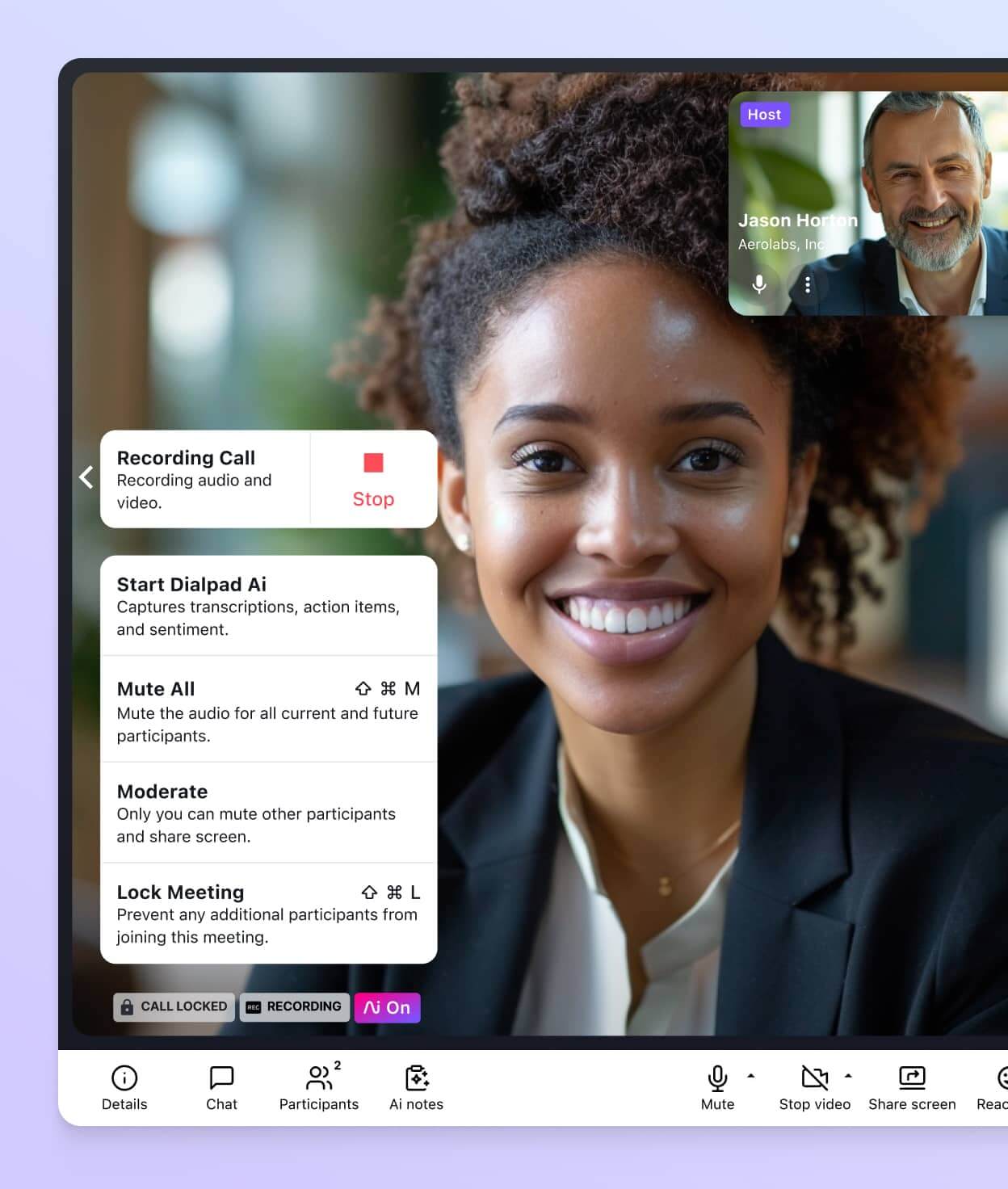
What is "call center recording", exactly?
Call center recording refers to the process of capturing and monitoring inbound and outbound calls, along with screen recordings, to evaluate agent performance and workflows. While tracking metrics is crucial, reviewing call recordings provides a more comprehensive view of agent interactions. Many cloud contact center platforms, like Dialpad, offer integrated call recording functionality, streamlining the process and ensuring a more efficient workflow.
How Dialpad’s call center recording software protects & improves your business
Having recordings of calls is valuable for resolving disputes and addressing customer complaints because they provide a clear, verifiable record of every interaction, which can often help clarify misunderstandings or provide evidence in the event of a legal issue. In fact, a recorded call can sometimes act as a verbal contract, offering crucial proof of agreements made during customer interactions.
With Dialpad’s call center recording software, your recordings are securely stored in the cloud, making them easily accessible for review, compliance checks, and training—without the need for on-site hardware. This also ensures that recordings are safely backed up and protected from data loss.
For businesses in highly regulated industries, call center recordings are a critical tool for reducing legal risks, and having detailed records of customer interactions can be the difference between resolving a minor disagreement or facing a costly lawsuit.
Dialpad Support also includes screen capture functionality, which improves agent training by allowing managers to review both audio and visual elements of customer interactions. This feature provides a more comprehensive view of agent workflows and helps pinpoint areas for improvement.
Contact center recording for quality management
Effective quality management at scale is a challenge for any contact center, and Dialpad’s contact center call recording software makes it easier by providing comprehensive tools to track and improve agent performance across all communication channels. Call recordings allow managers to review both new hires and experienced agents’ interactions with customers, and all customer touchpoints are captured and stored in one unified platform, giving managers a complete picture of agent performance across all channels.
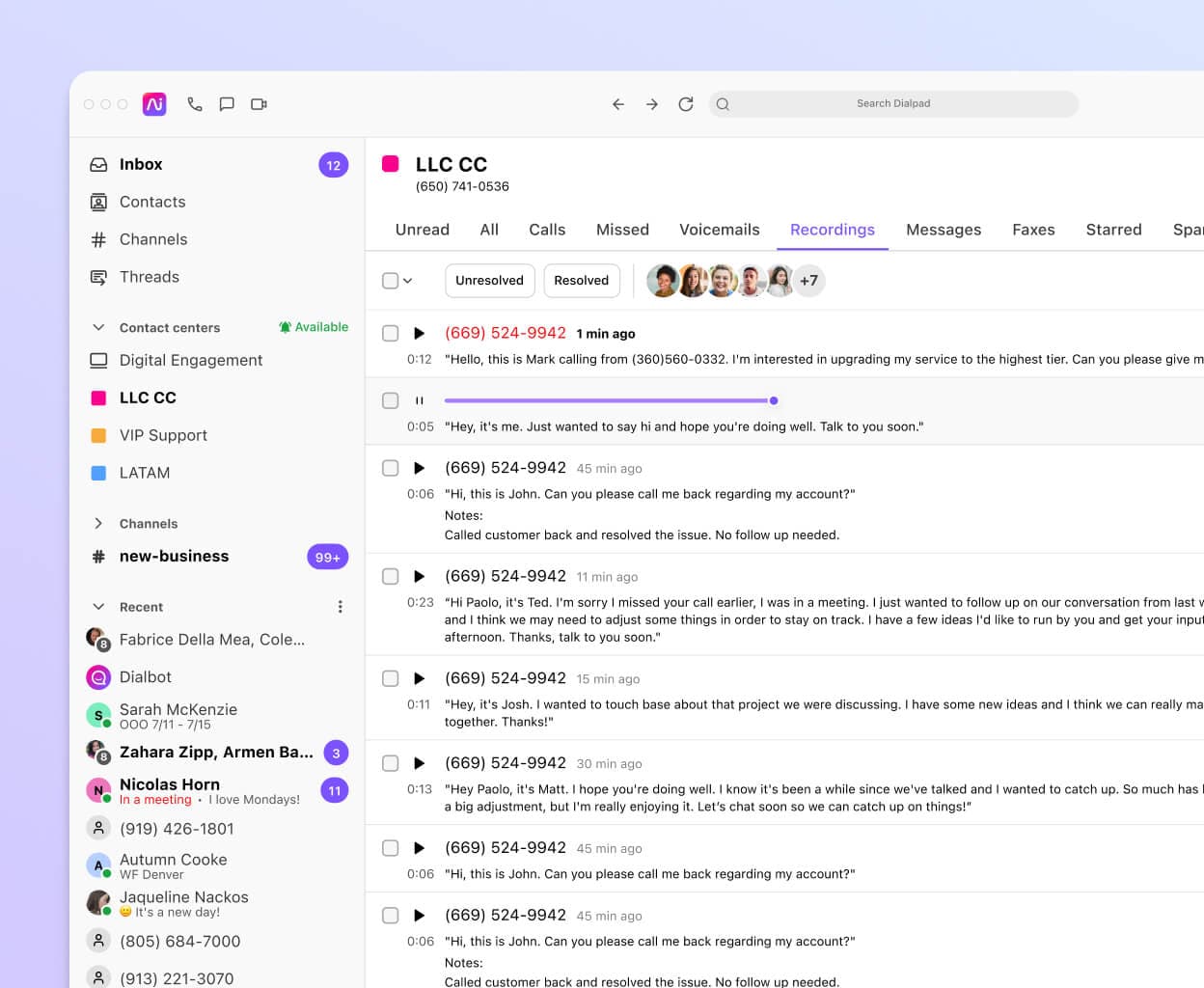
Ai-driven coaching insights
In Dialpad, you can also create a playlist of customer call recordings that highlight where there’s room for improvement—or show agents examples of excellent call handling.
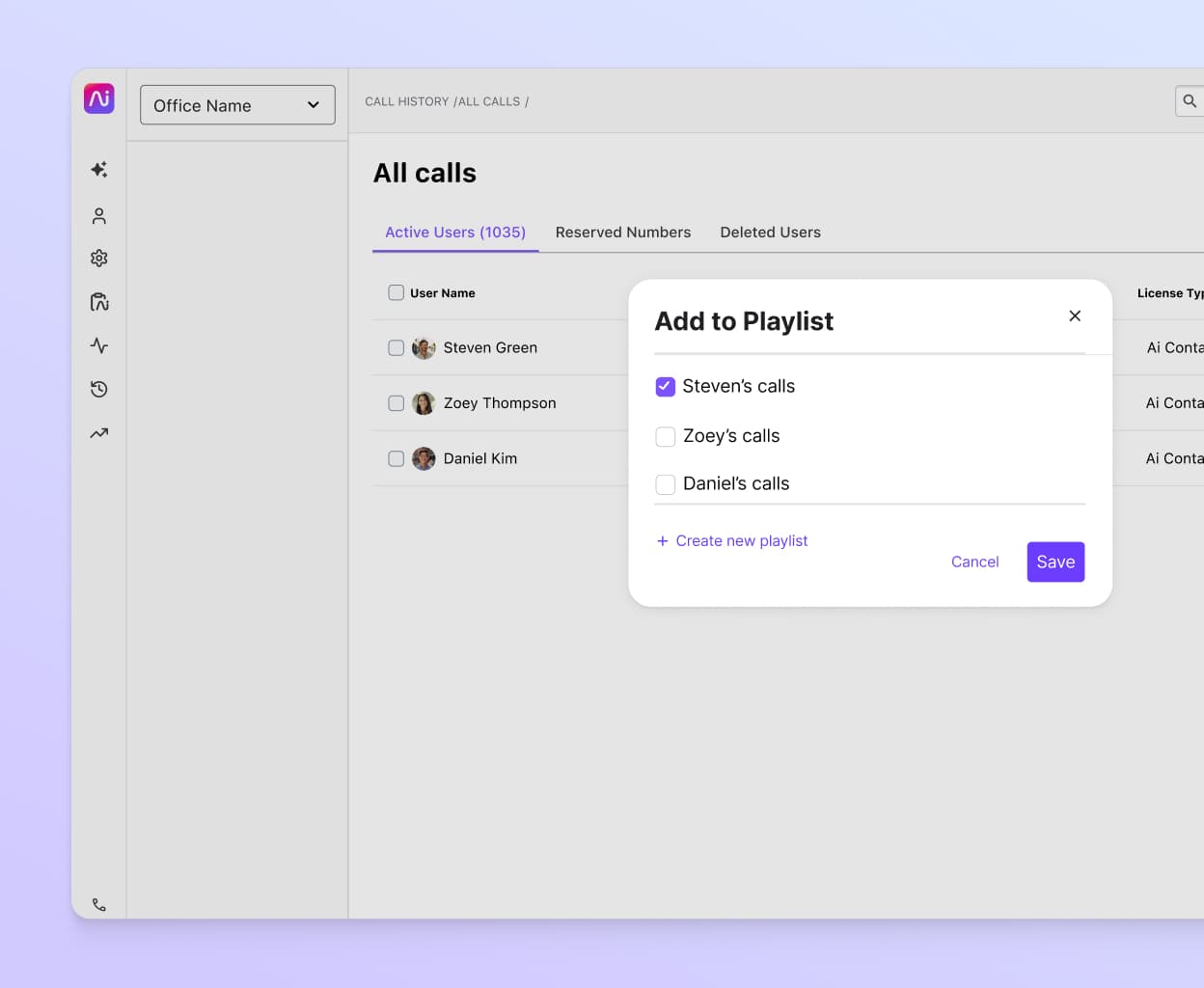
Actionable post-call summaries
Not only can you record calls, Dialpad Ai also generates a post-call summary email, which will be sent to attendees with the recording, call center transcripts, and action items so that agents can review how things went.
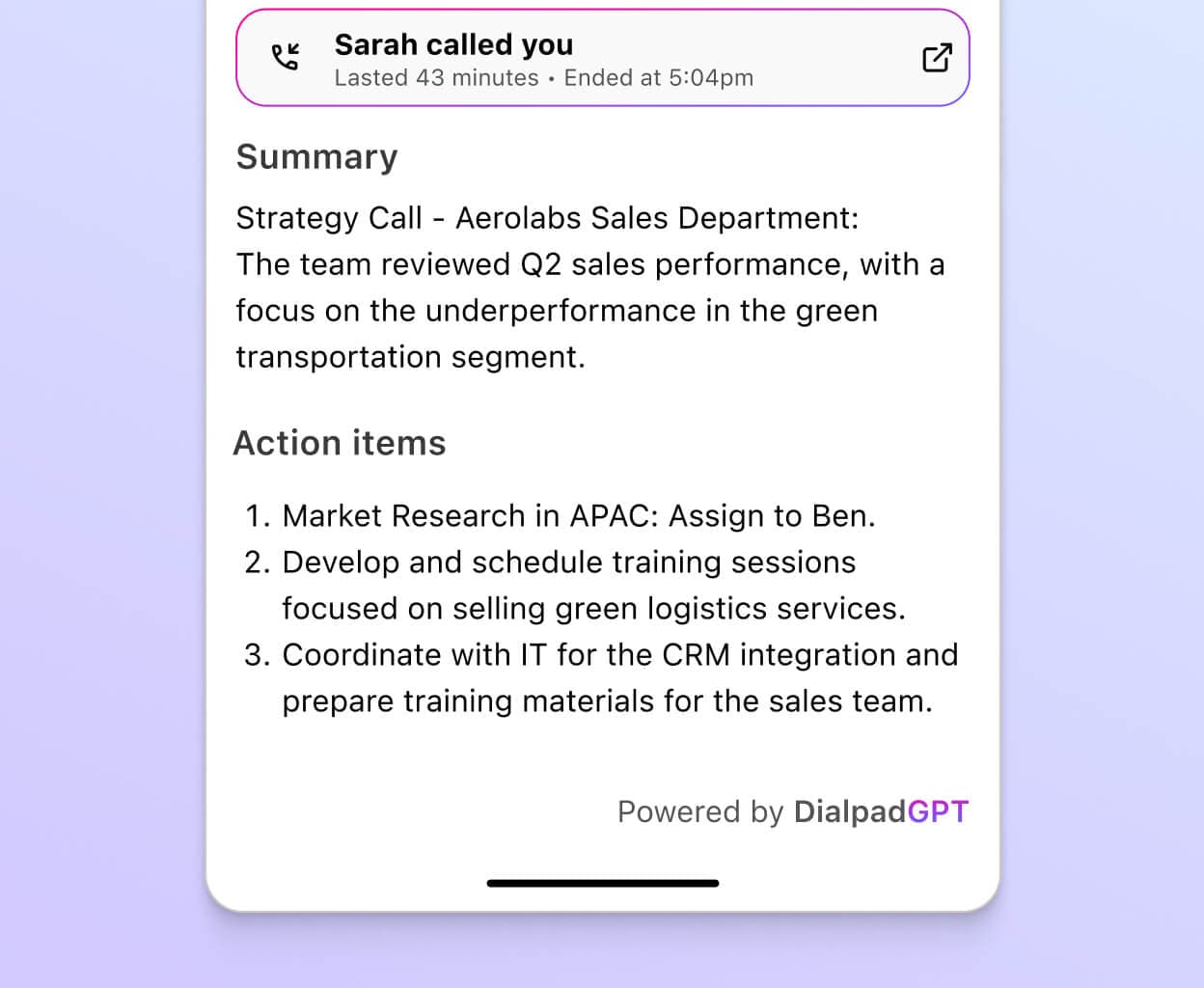
Advanced compliance & security controls
Dialpad’s call center recording software not only helps improve customer service and training but also plays a critical role in ensuring your call center meets compliance standards. Its recording and APIs allow agents to automatically pause recording and transcription when they're taking sensitive information. (For example, when they open up a particular screen or field to take down healthcare information—and restart recording/transcription once they close that window.) Dialpad also offers the ability to customize call recording announcements to notify customers when calls are being recorded, further ensuring compliance with local laws and providing transparency.
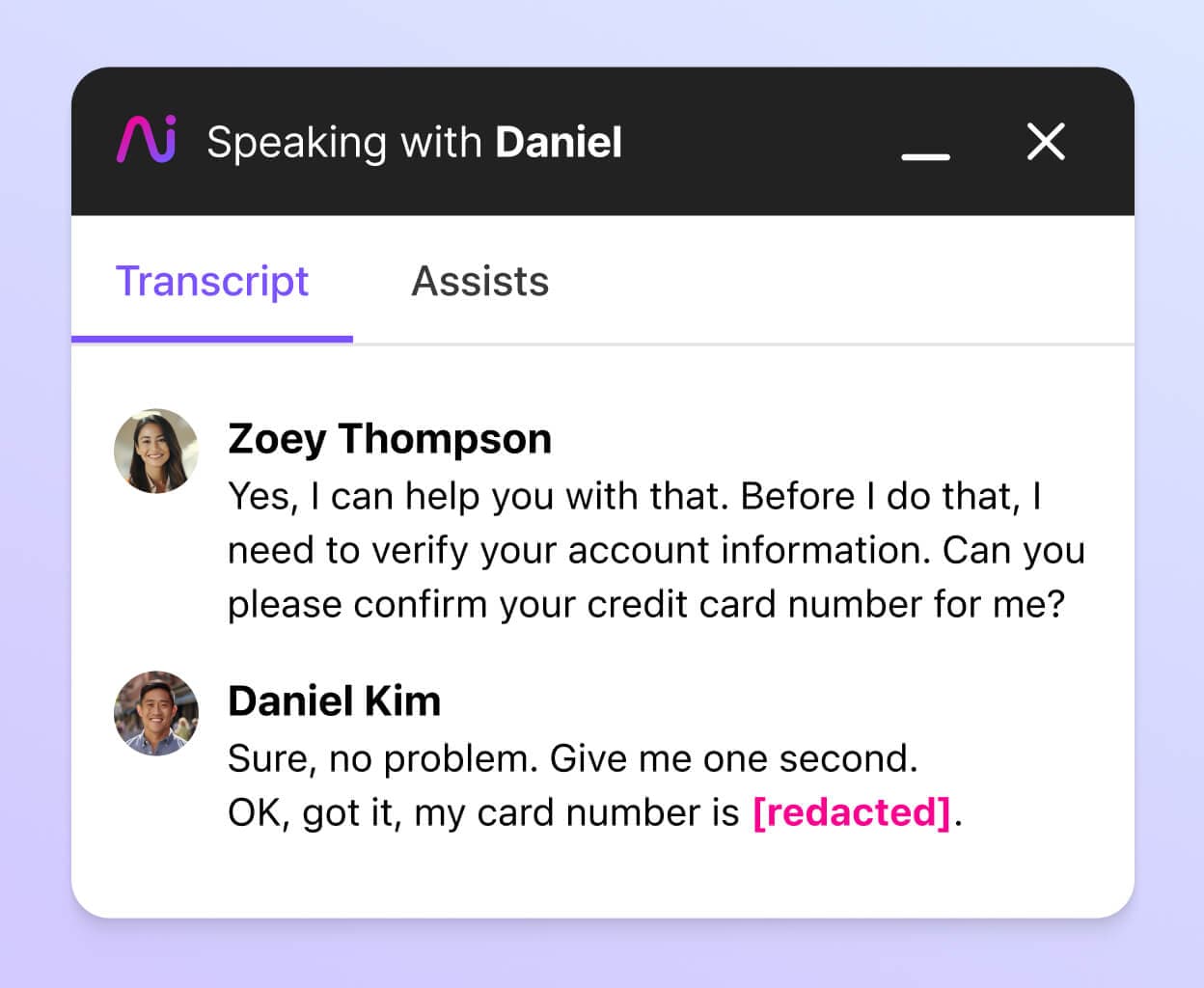
Real-time transcripts & analytics
For contact center supervisors managing large teams, Dialpad’s call center recording solutions offer powerful analytics-driven features to help monitor key performance metrics, improve agent productivity, and ensure consistent service quality. Dialpad’s speech and voice analytics technology goes beyond just transcribing calls in real-time, giving supervisors actionable insights into frequently mentioned topics and complaints, sentiment, and more. On top of that, Dialpad's analytics dashboard aggregates key metrics, offering an at-a-glance view of performance indicators like call volume, resolution times, and abandonment rates.
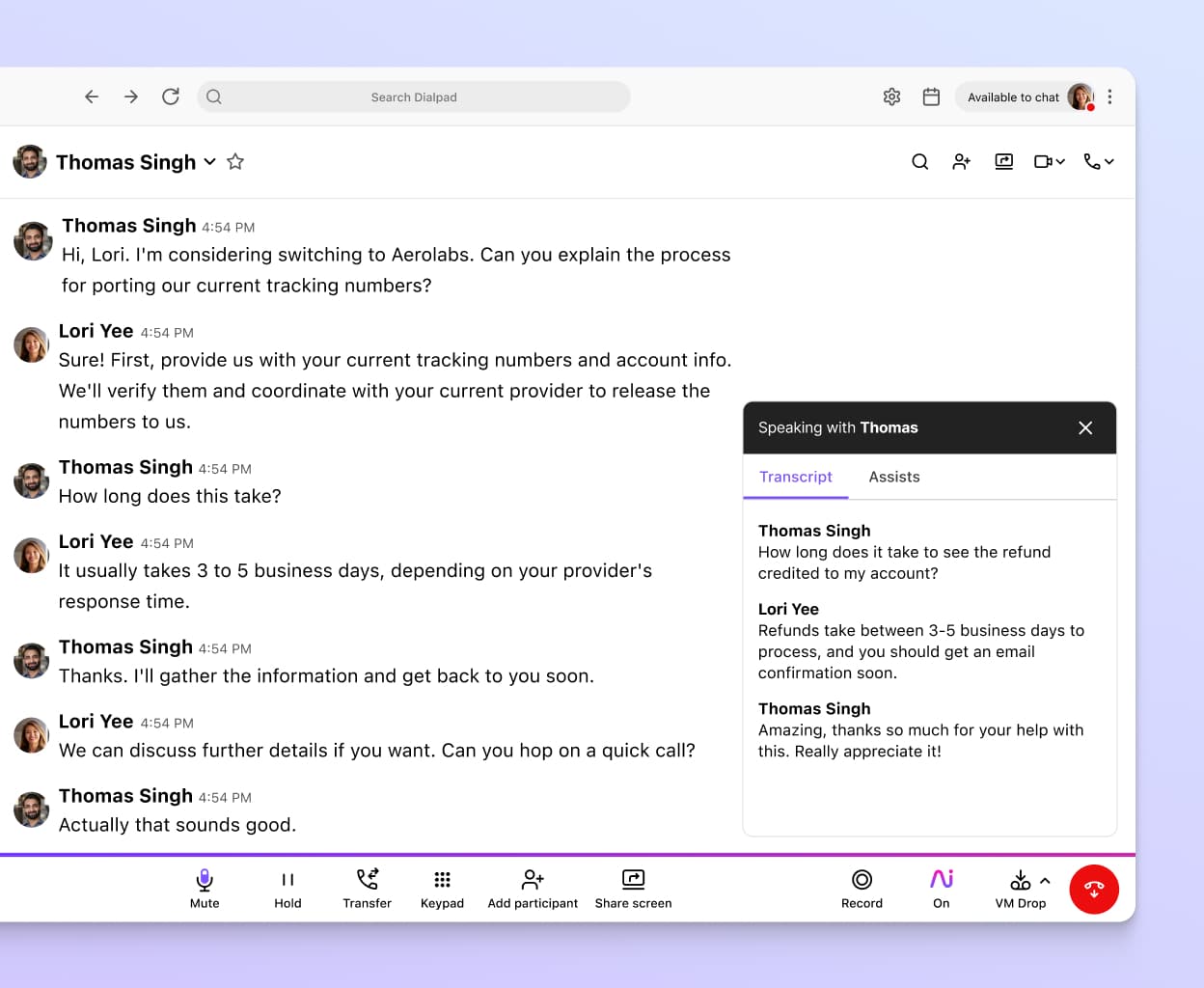
Integrations with CRMs
Dialpad integrates with CRM software like Salesforce, HubSpot, and more to automatically log calls and activities for agents—and even embeds a CTI dialer to allow them to have phone calls with customers right in the CRM.
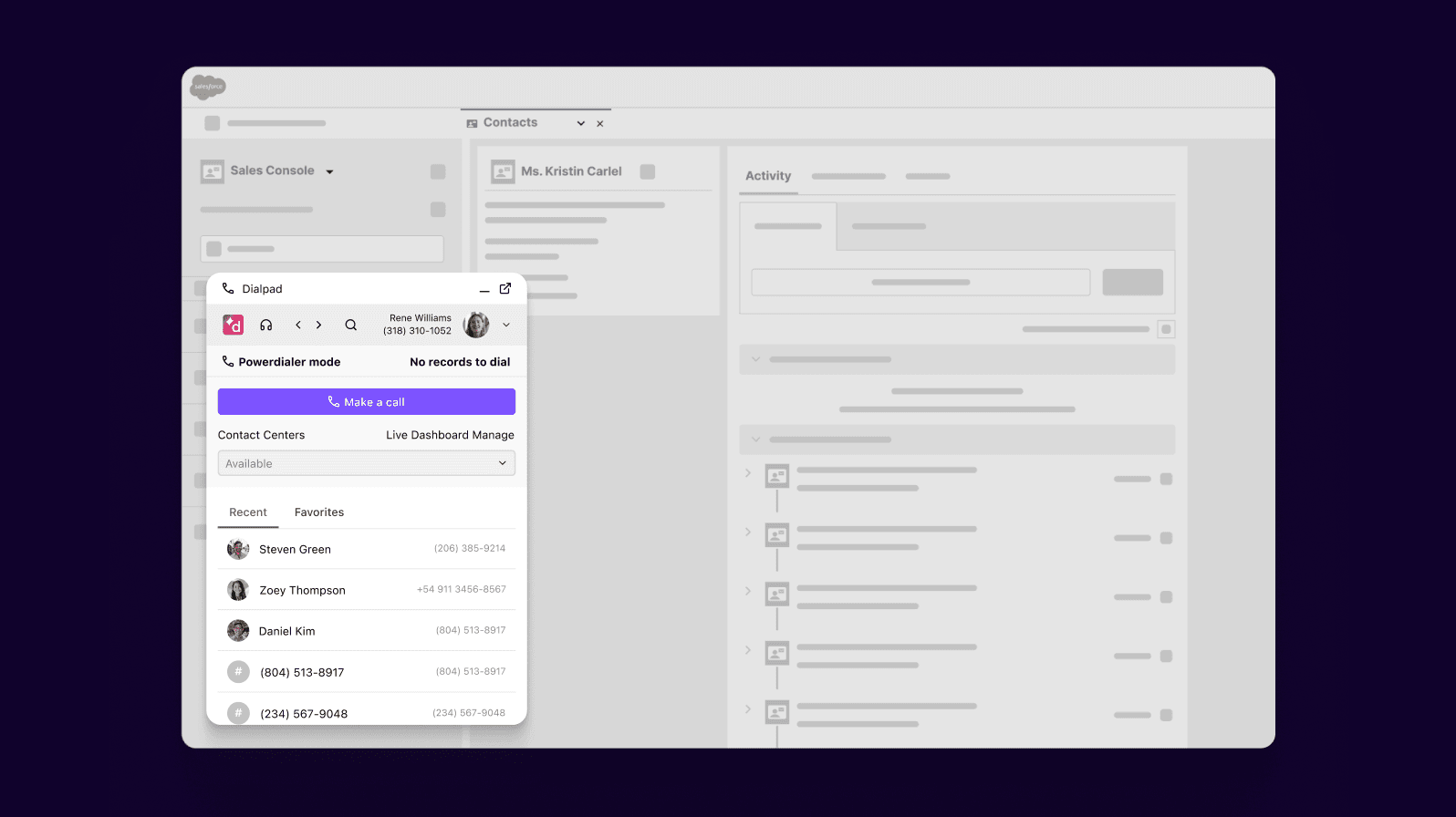
Real-time assistance & call support for agents
When reviewing call recordings, you may notice that certain tricky questions keep coming up from callers. In Dialpad, you can create a Real-time Assist (RTA) card, which is like a cheat sheet with tailored notes. Set it to trigger automatically on an agent's screen when certain keywords or phrases are spoken!
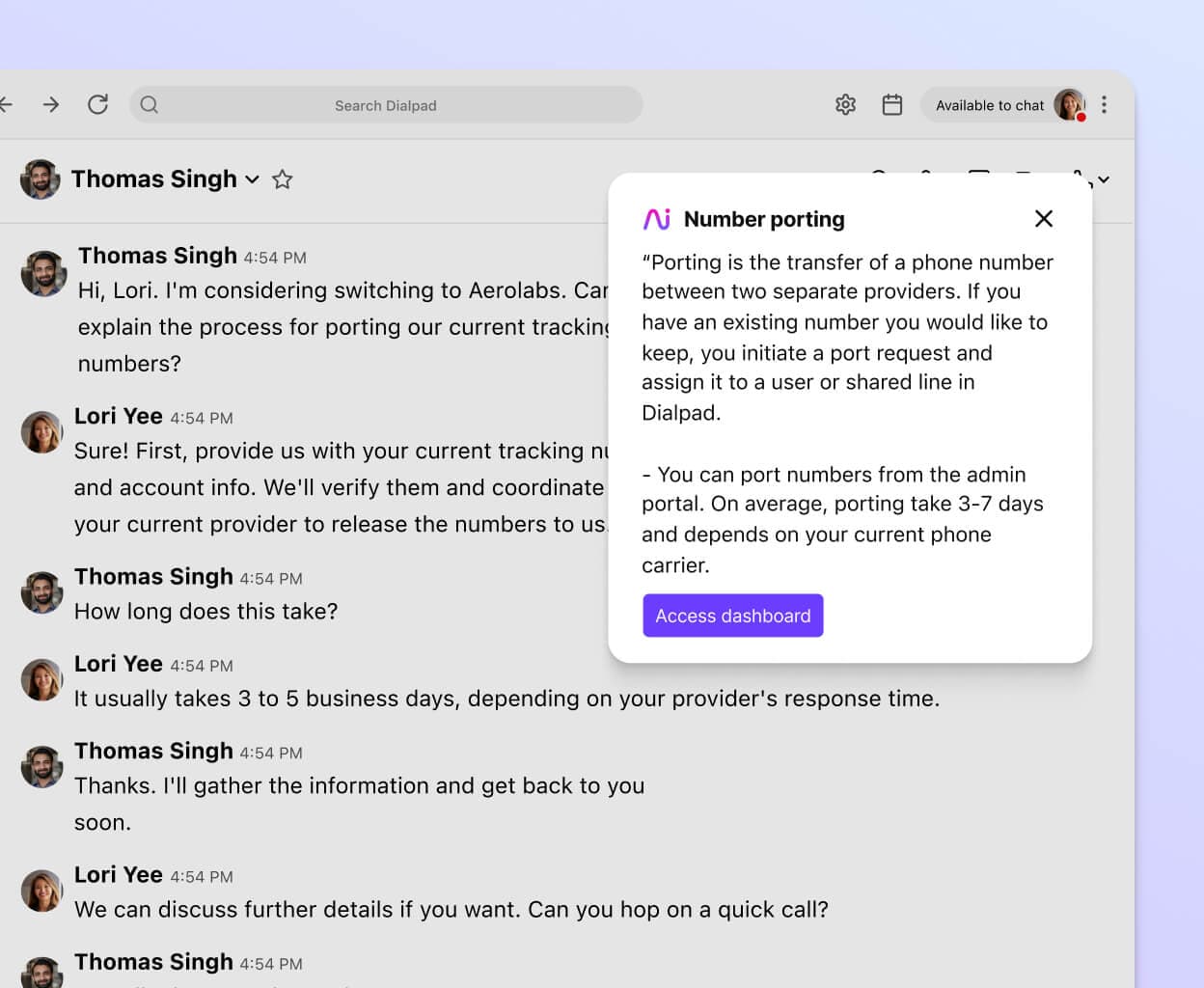
Need better compliance and dispute resolution?
Book a product demo to see how Dialpad's call center recording feature can make that easier for your agents and supervisors. Or, take a self-guided interactive tour of the app on your own!
We love that we can jump right in on Dialpad, pull call recordings, and listen to those. And we can set it so that recording starts automatically, so we don’t have to say ‘Don’t forget to hit record on the call.
Will Musto
Director of Operations at The Roman Healthcare Group
Trusted by the world’s biggest brands
More benefits of call center recordings
Easier quality assurance
Reviewing recorded calls for quality management allows you to see and hear the quality of your customer support directly. This way, you can better understand both the strengths and weaknesses in your agents' approach and also tailor automated responses in your voicemail, IVR (Interactive Voice Response), and in-call messages more effectively.
Improved customer retention
Not only can recorded calls highlight areas of improvement for contact center agents, they can also uncover potential product or service improvements. Say you just launched a new product to the market. Your call center then receives numerous calls complaining about a certain issue. By reviewing those calls, you can nail down exactly what the issue is, report back to the relevant product team, and get it resolved quickly to boost customer satisfaction and retention.
The legalities of call recording
You probably already know that US laws can be a complex maze—especially when you have to consider both federal and state legislation.
That’s also true when it comes to recording calls in your contact center. But there is one well-worn phrase that you need to keep front and center:
“This call may be monitored or recorded for quality and training purposes.”
There are two main concepts (and one exception) governing the recording of any sort of telephone conversations, whether business phone calls or personal:
One-party consent. 38 states and DC operate this form of consent for any type of recorded consent.
Two-party consent. 11 states operate this where ALL parties must give consent for a call to be recorded
Interestingly, Vermont has no law in place for this, so would be a one-party consent state under federal law.
Úsing the handy phrase (or a variation of), “This call may be monitored or recorded for quality and training purposes,” lets your customer the call will be recorded and that if they choose to proceed, they’re consenting to that happening.
Of course, you can’t always just automatically record inbound and outbound calls. That’s why with Dialpad, you can make sure you’re complying with the laws of different states by setting up exceptions for any locations you need to. There’s even the option of recording only the agent’s side of the conversation and not the customer’s—which can still help with quality control and dispute resolution.
Now, the other laws... Yes, in some cases, you need to consider other regulatory requirements beyond the simple idea of recording information:
PCI compliance. Payment card industry compliance comes from the credit card providers, and governs what can and cannot be discussed or recorded. The PCI’s data security standards (DSS) includes; “12 key requirements, 78 base requirements, and 400 test procedures to ensure that organizations are PCI-compliant.” Yep. It’s a lot.
PHI compliance. If your organization is in any way connected to healthcare, then this is something you need to consider. PHI (protected health information) is governed by the Health Insurance Portability and Accountability Act of 1996 (HIPAA). If you do deal with clients’ health information or work in healthcare, it’s worth considering using a platform that’s compliant with HIPAA requirements.
Which contact center call recording software is right for you?
Not all call recording software is created equal, so think about what will best meet your business needs and help with compliance requirements.
1. Contact center or call center software
As the name suggests, contact center or call center software is a special type of software that can capture audio (and sometimes screen) recordings of calls to or from a call center. Most of these apps allow you to not only take the call, but also record it and store the recording—all in one convenient place.
Some solutions may even give you the option of monitoring calls live so that managers and supervisors can listen in to make sure that agents are providing a good customer experience. (Especially helpful for coaching new hires!)
Generally, it’s best to choose a platform that takes into account future growth and expansion. Even if you’re a relatively small contact center at the moment, you’ll need a versatile, scalable solution if you plan to grow.
For example, with Dialpad Support, all the recording features you need are built right into your contact center software and you can even listen to all your recordings in one place. No need to download a bunch of third-party apps and have multiple windows or tabs open.
2. A PBX phone system
A traditional, or some may say old-fashioned, system, PBX stands for “Private Branch Exchange.” These are private phone systems within a business that allows you to make and receive calls internally (and sometimes externally).
There are different types of PBX, like VoIP, ISDN, or analog—you can learn more about them here.
Typically, the admin of the PBX system can set up a call recording feature, though it might involve more work and back-and-forth with your provider to not only get the recording feature set-up, but also to access or retrieve recordings down the road.
👉 Dialpad tip:
If you’re considering switching to a cloud phone system from your on-premises or PBX system, Dialpad will help you port all your old PBX numbers over—no expensive IT consultants needed.
3. Other third-party software
The third type of call recording solution is, well, whatever your agents are using on their own because you haven’t given them a tool to use.
This is possibly the worst choice for a contact center or call center, especially if you’re already taking tens or hundreds of customer calls a day, because there’s no consistency. Everyone’s recording their calls using a different app, and there’s no easy way to access all your recordings in one place.
(And don’t get us started on the security issues.)
Even if your team is small and scrappy now, the recording of calls is a big thing to plan for. There are legal questions, and also just huge impacts it can have on your customer experience as you grow. If you’re using option 3 right now, make a plan to get off of it as soon as you can.
Call center recordings: A key tool for contact center managers
No matter how big or small your team is, call center recording is essential in running a modern contact center.
From quality control to compliance, a good call recording solution can go a long way in improving your customer experience—without adding headcount. Before making a decision as to which call recording system best meets your team’s needs, make sure to outline what your actual recording needs are.
(How strict are the recording laws in your state or country? How many calls are you taking a day? How many recordings will you need to store and organize?)
If your business interacts with customers on channels beyond phone calls, try to find an all-around contact center call recordings solution that not only lets you make and record calls but also includes other communication channels like SMS and video meetings.
Need call center recordings?
Call center recording is one of many core features that Dialpad's AI-powered customer engagement platform offers, along with real-time transcription and live sentiment analysis. See how it works with a product walkthrough!
